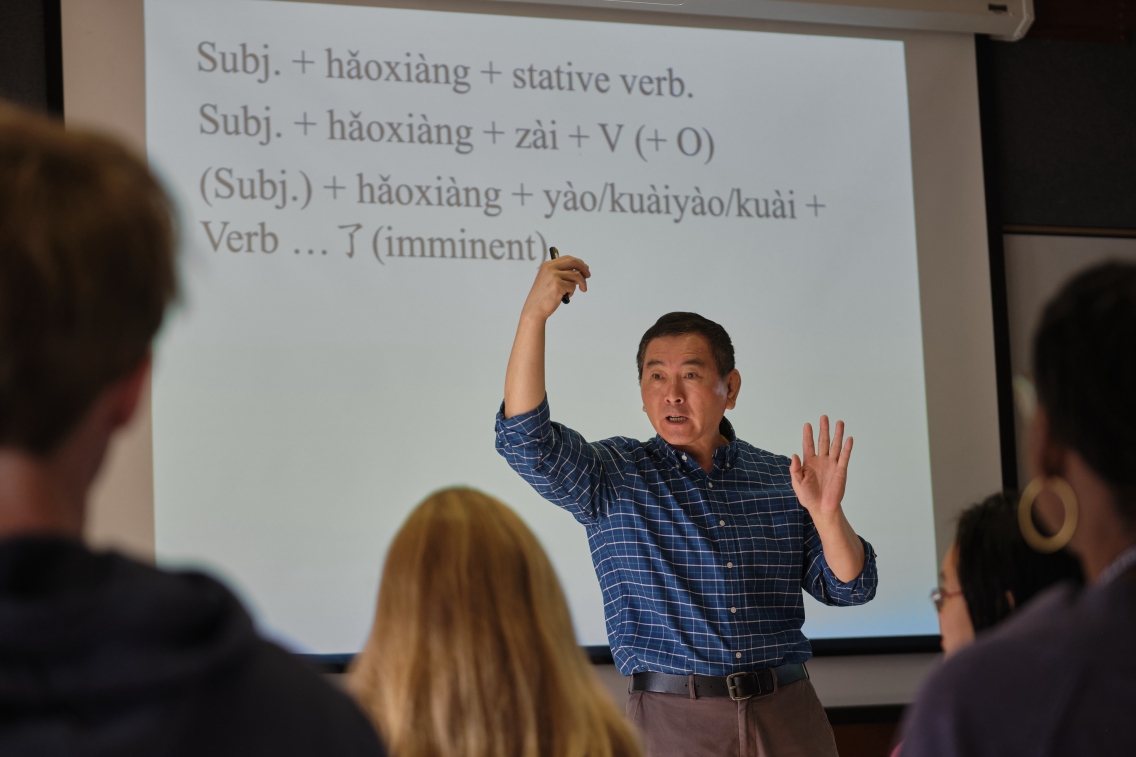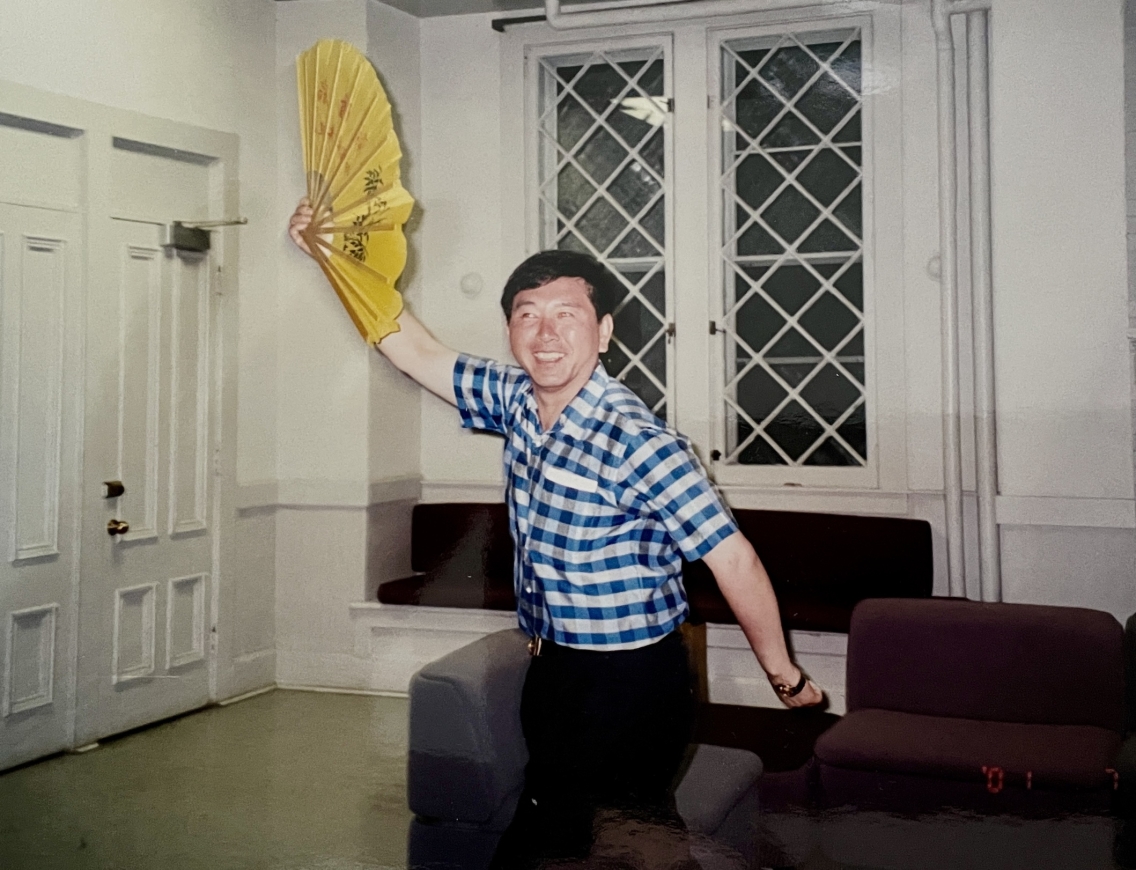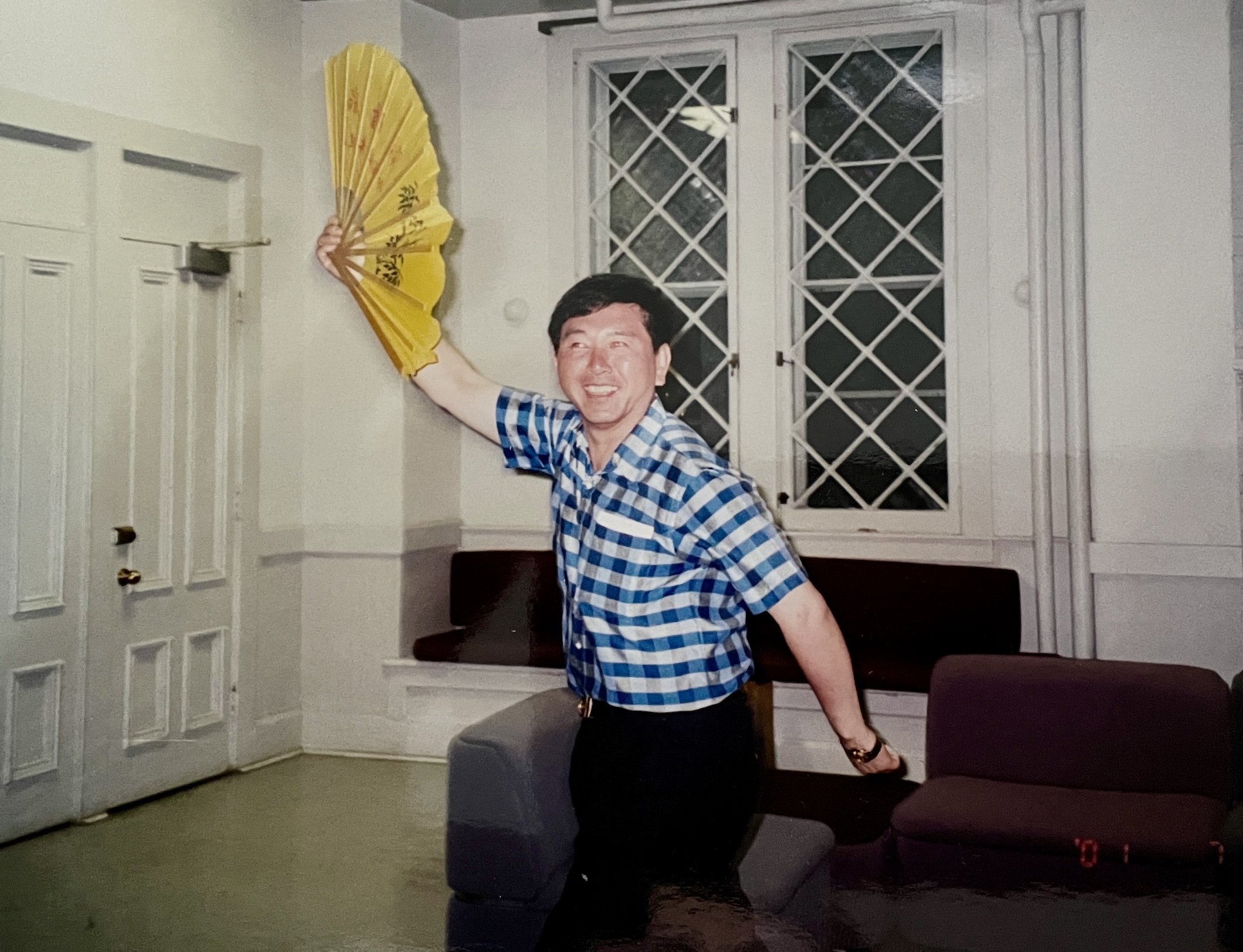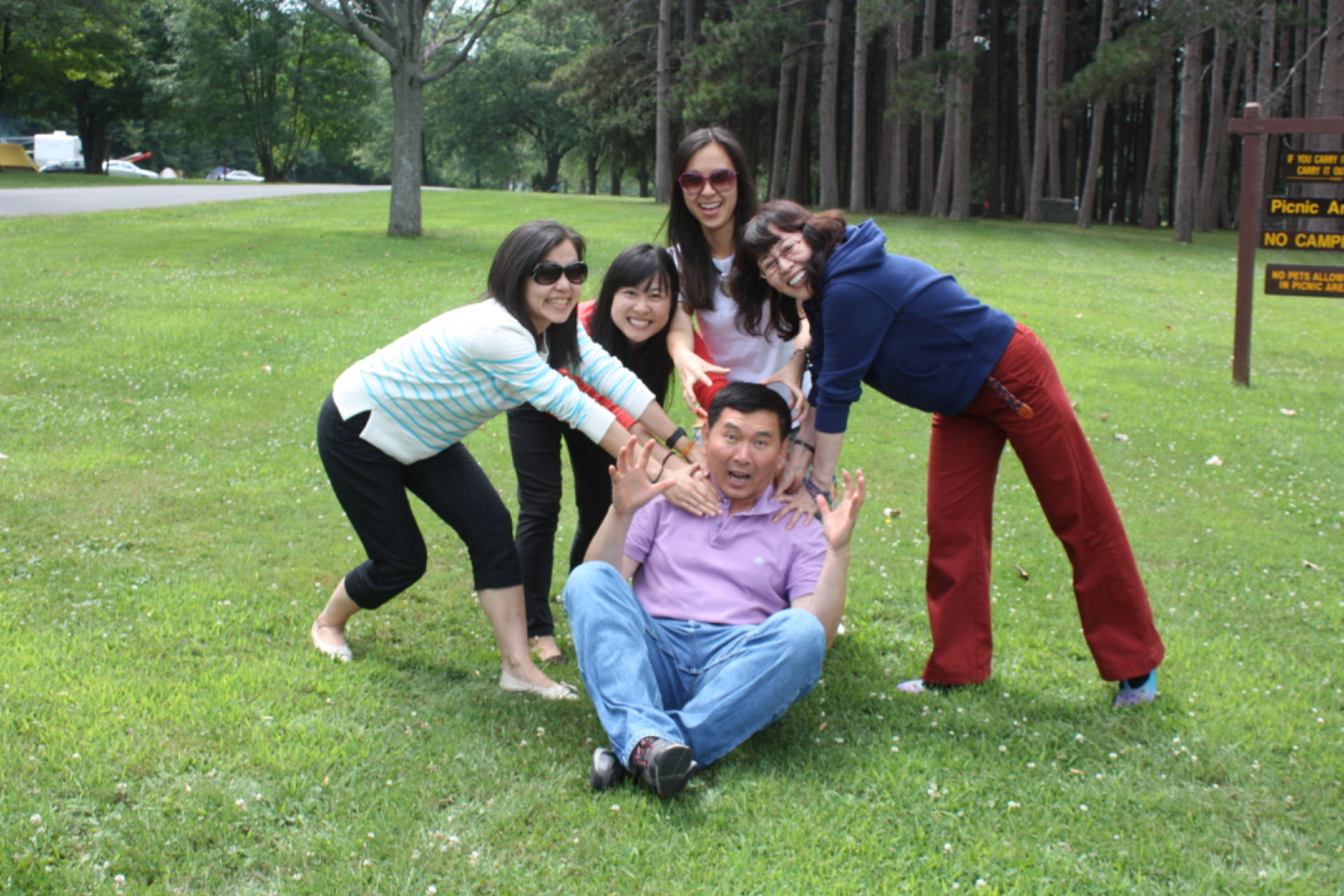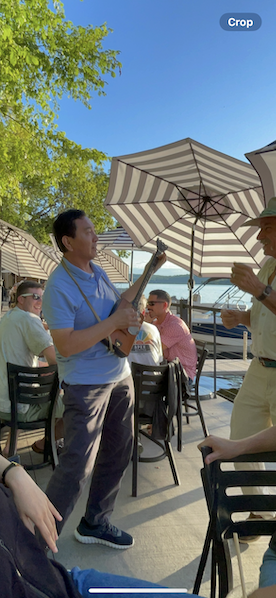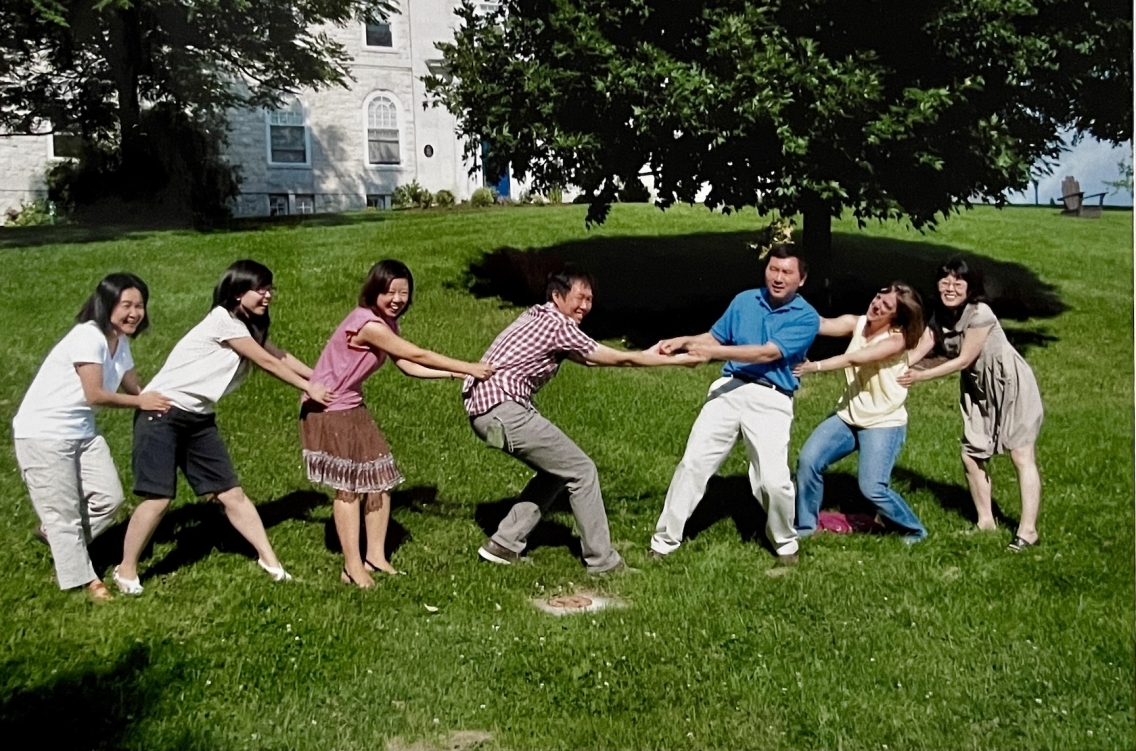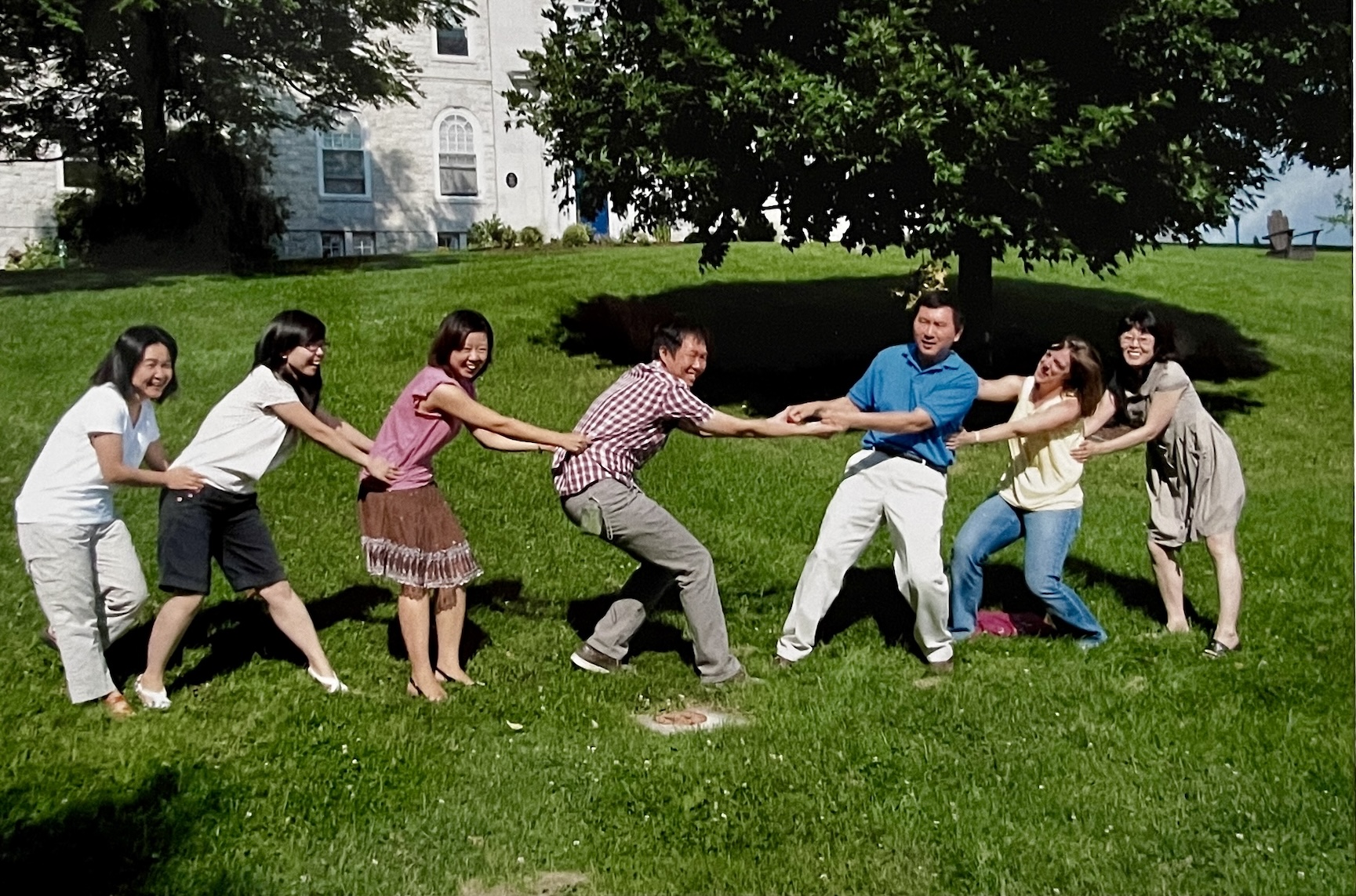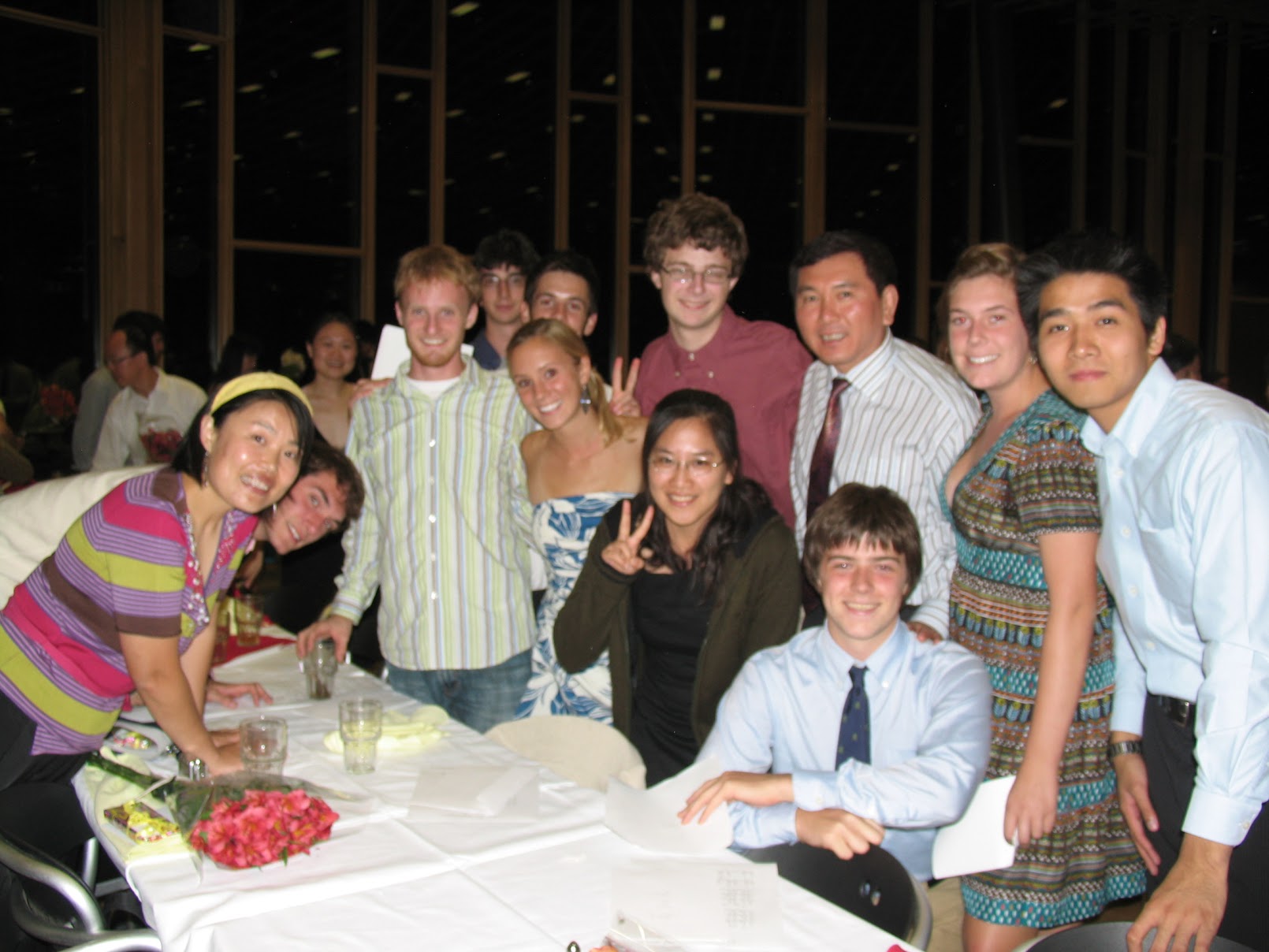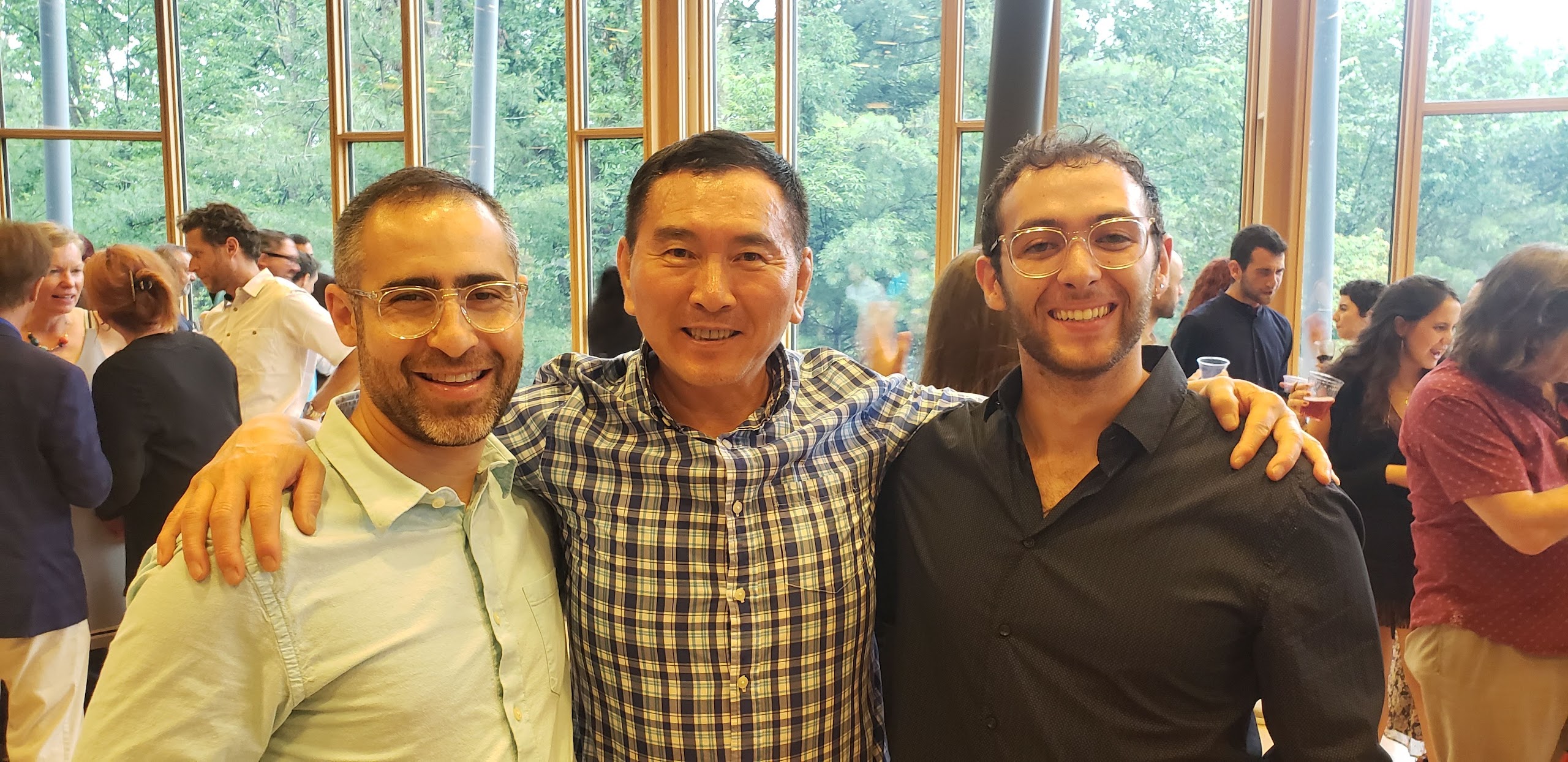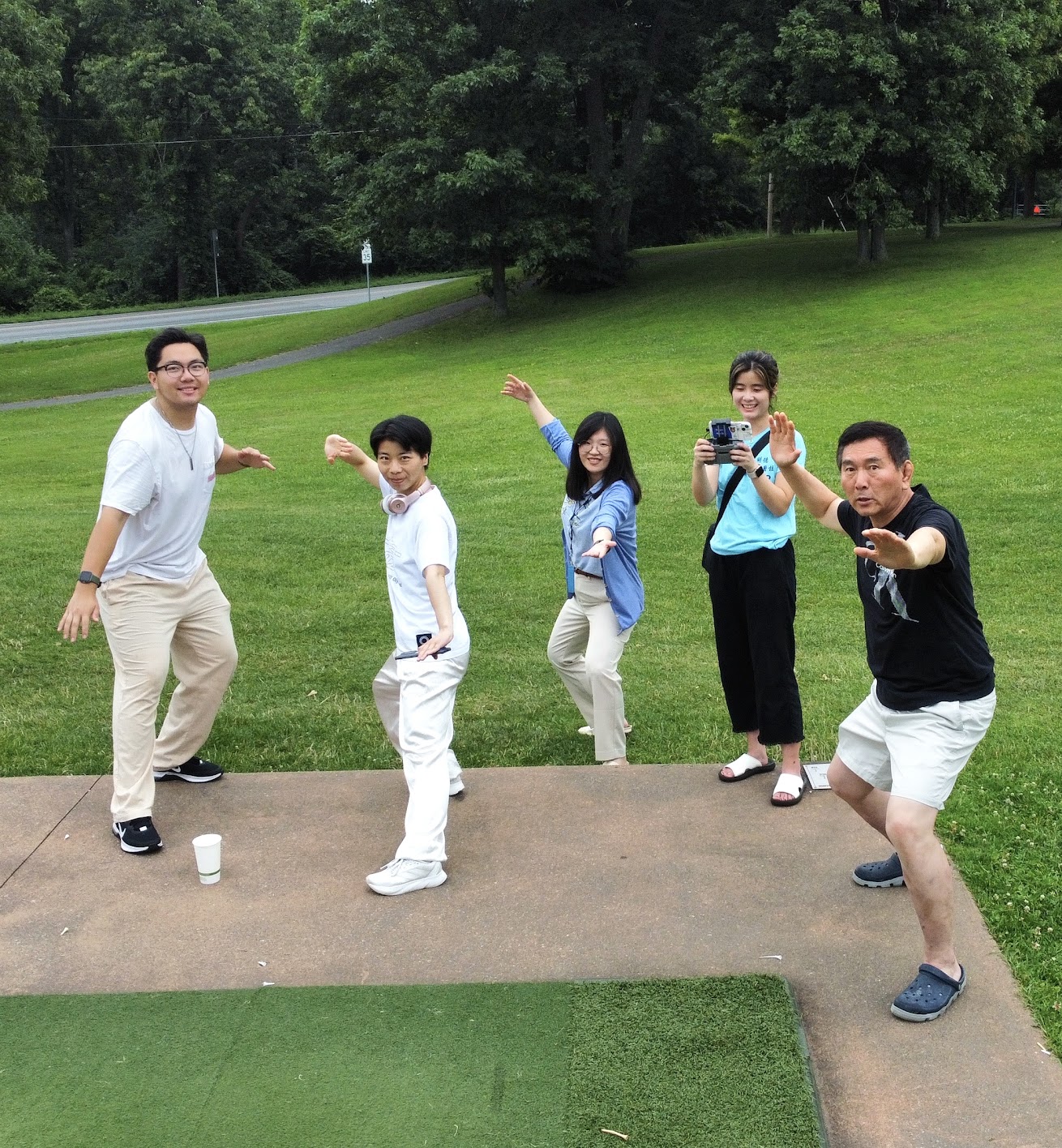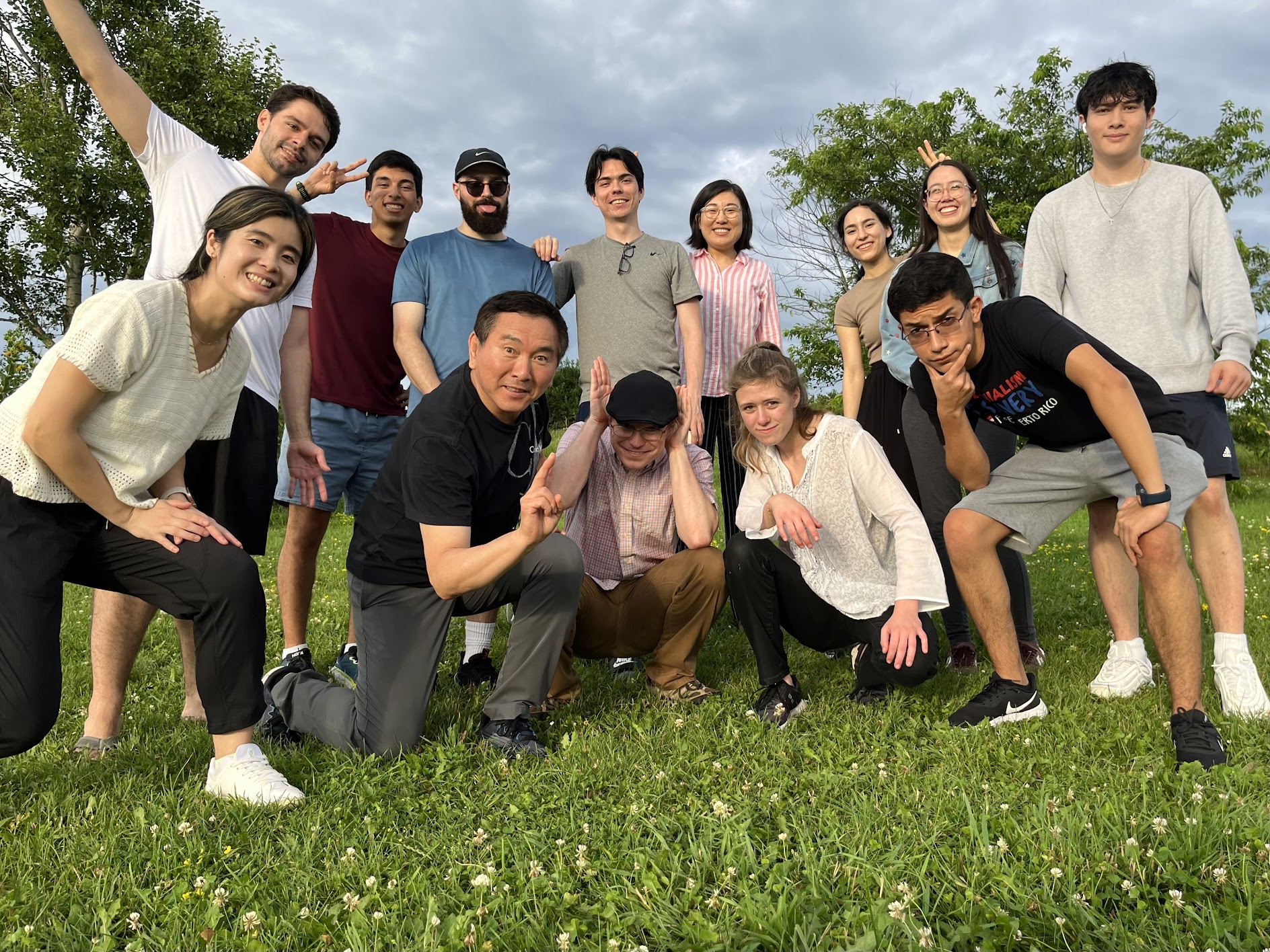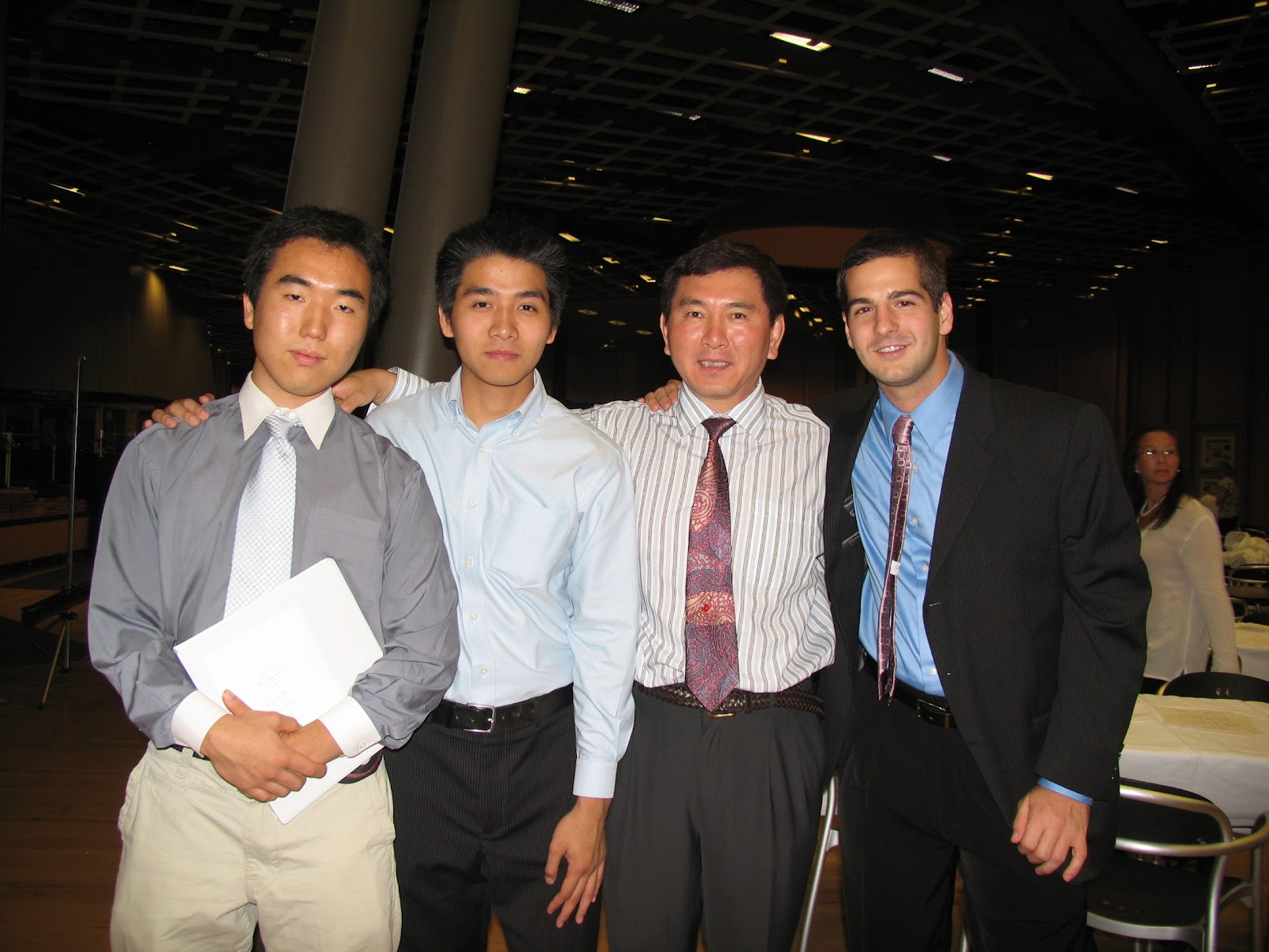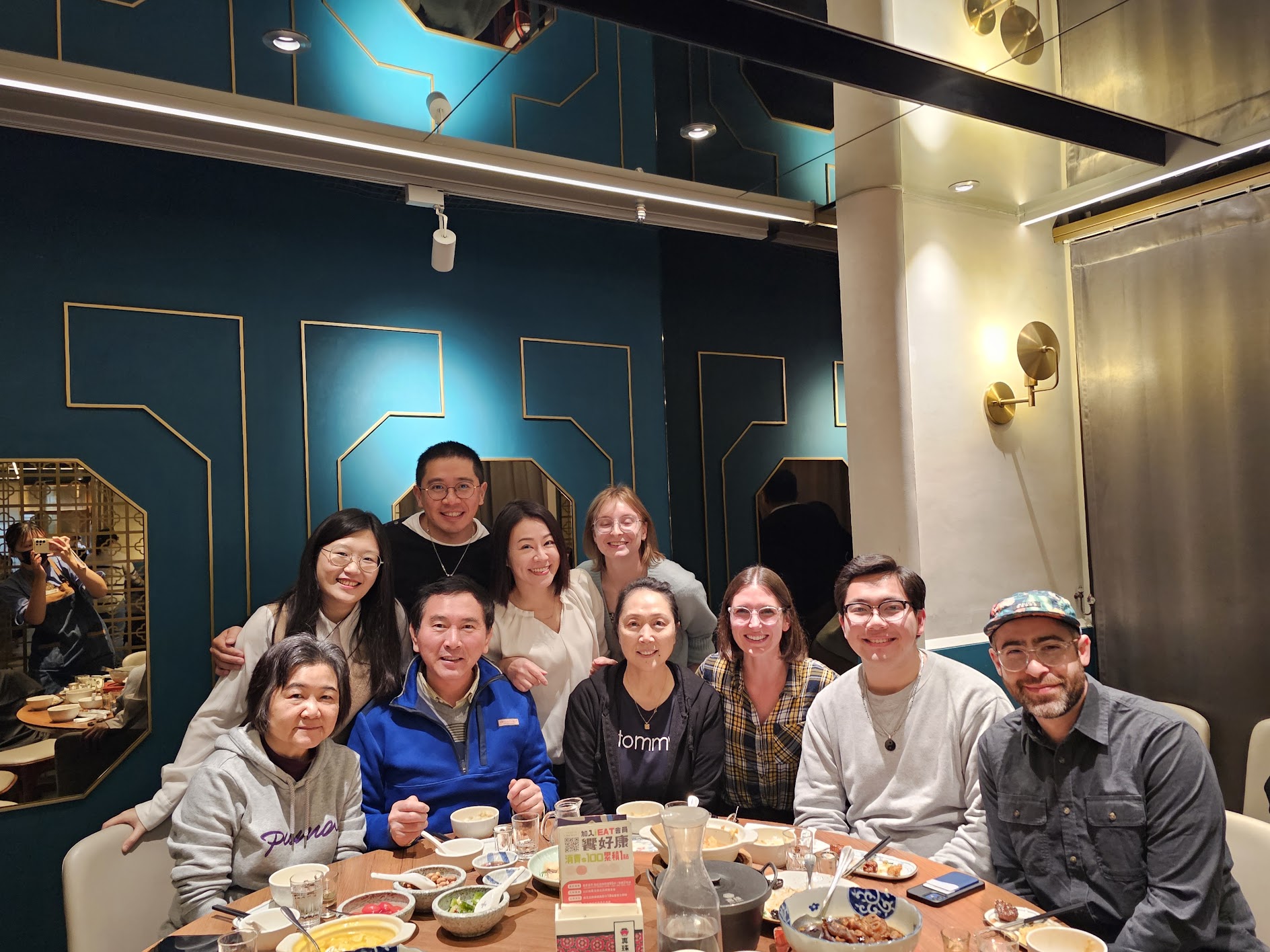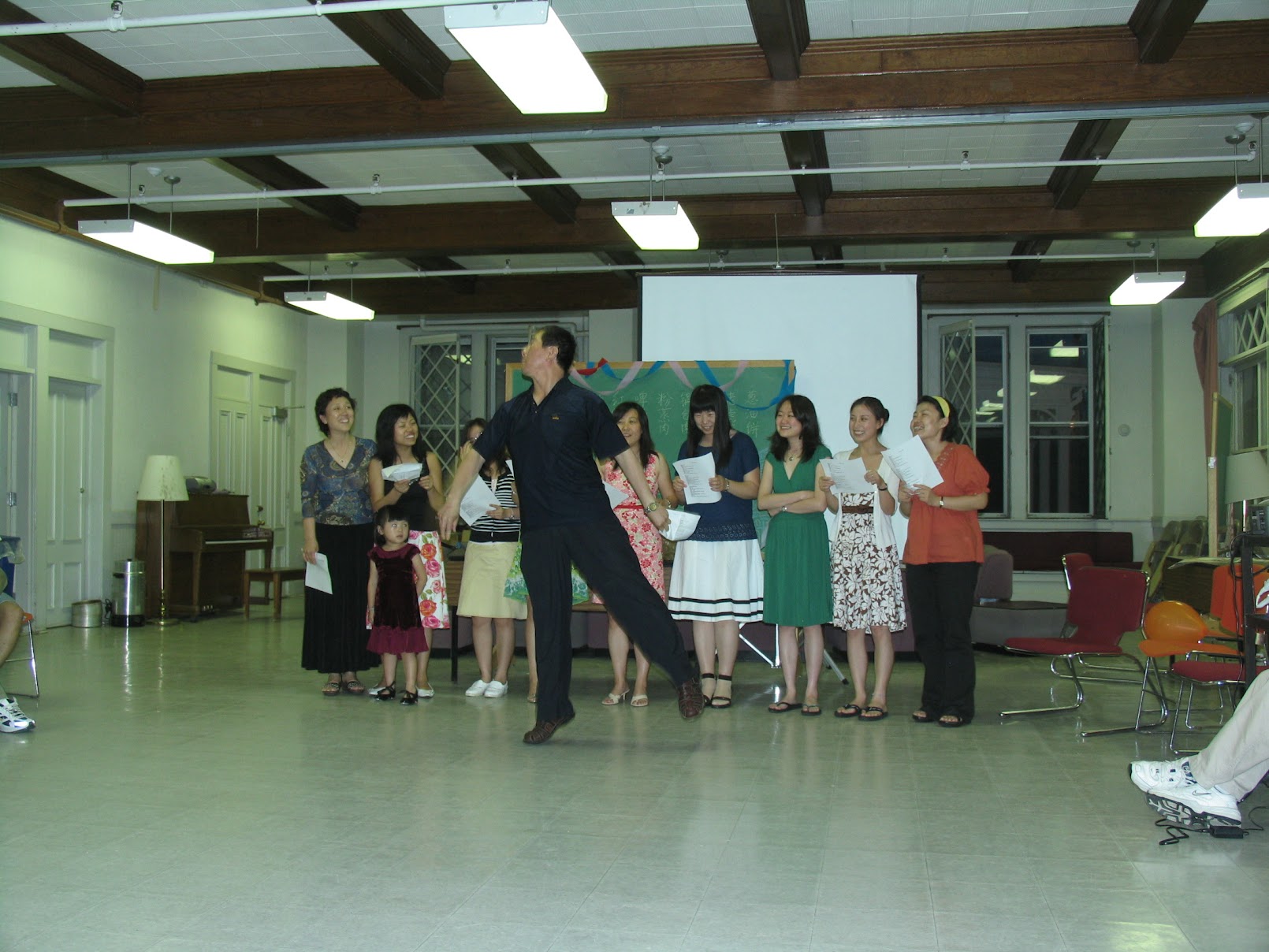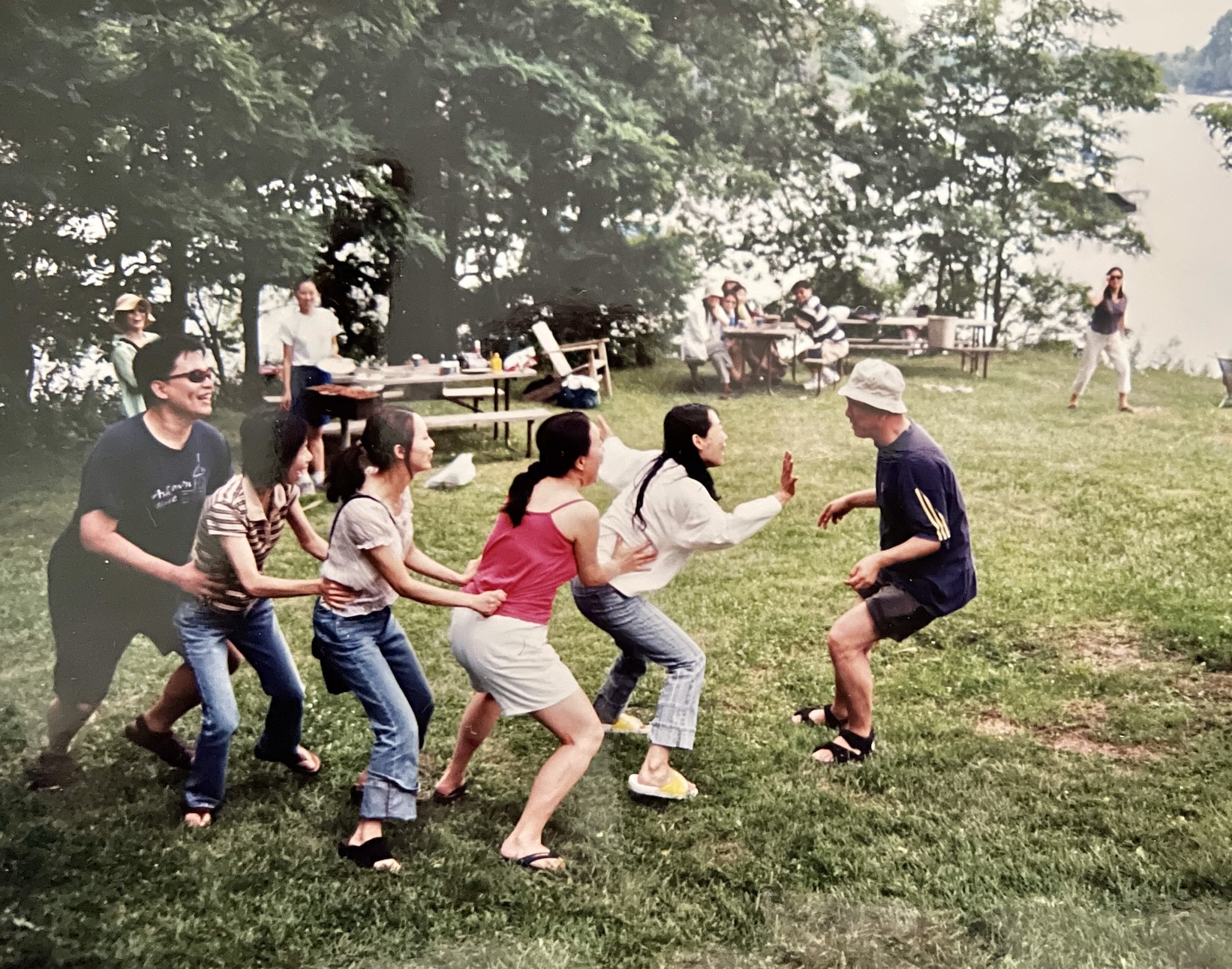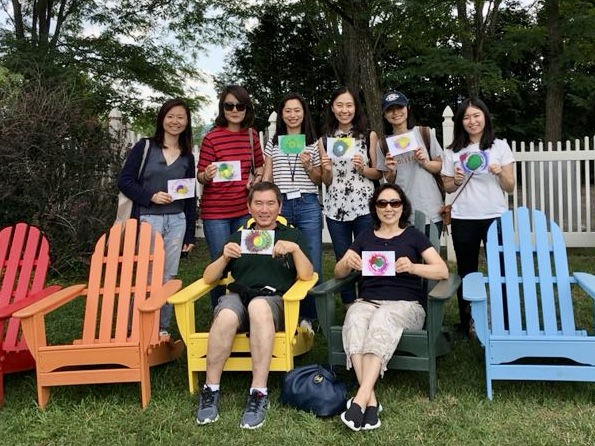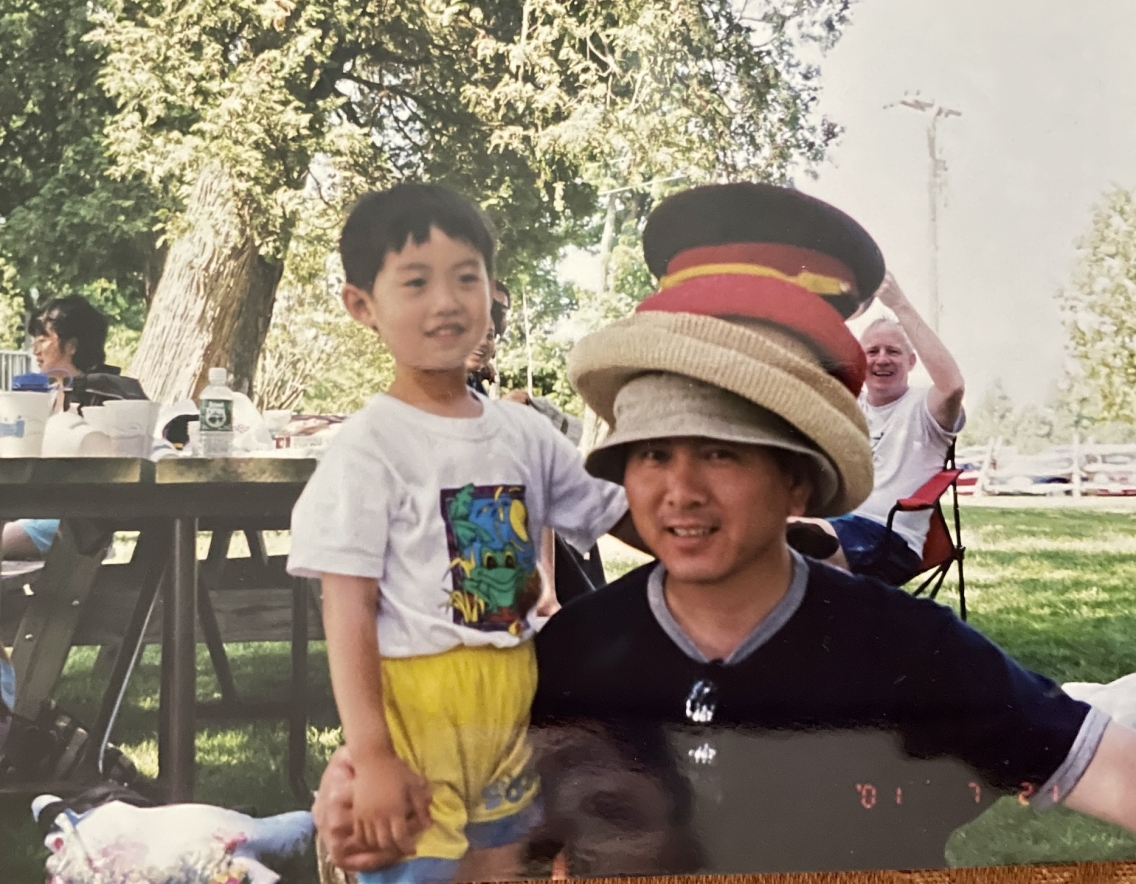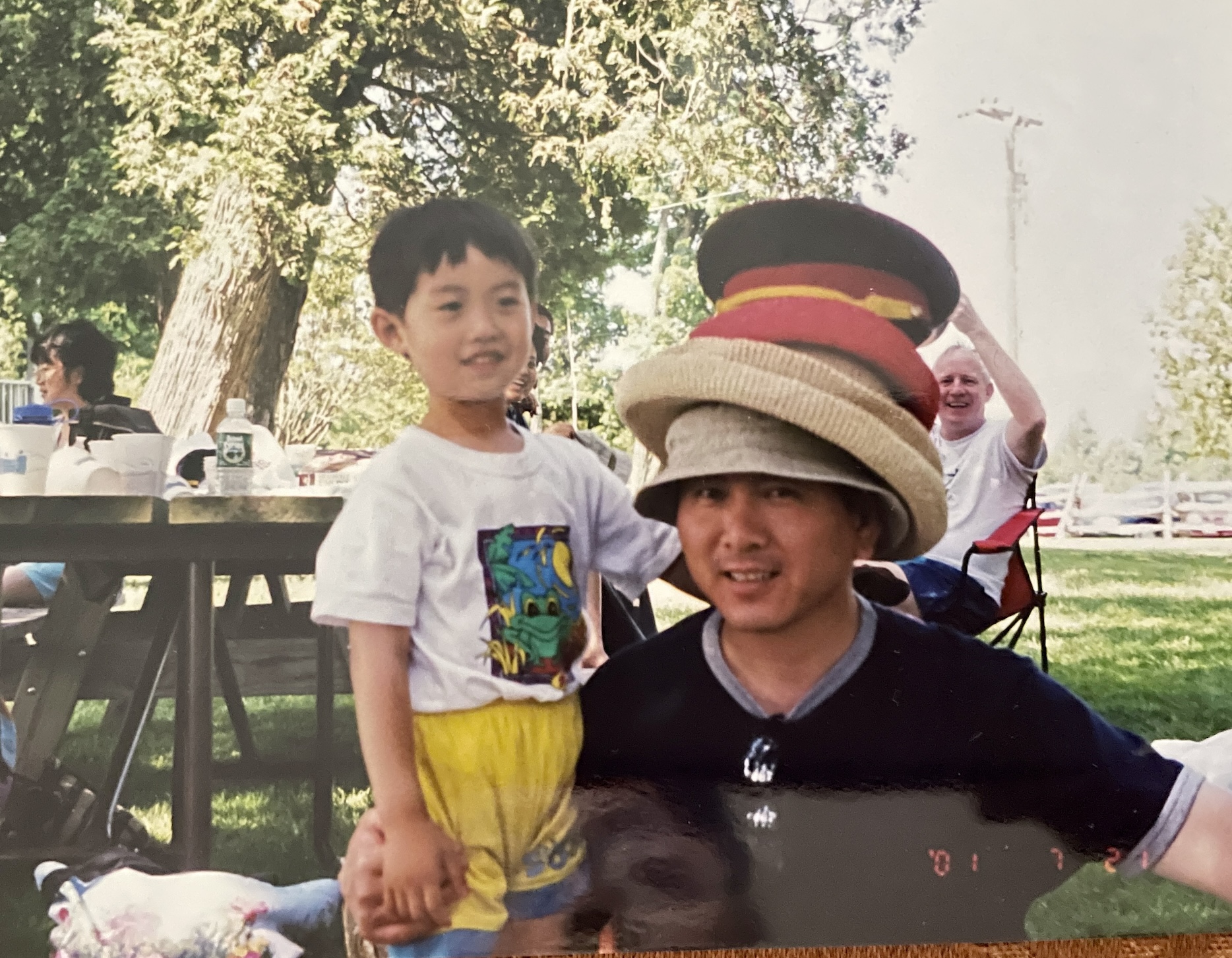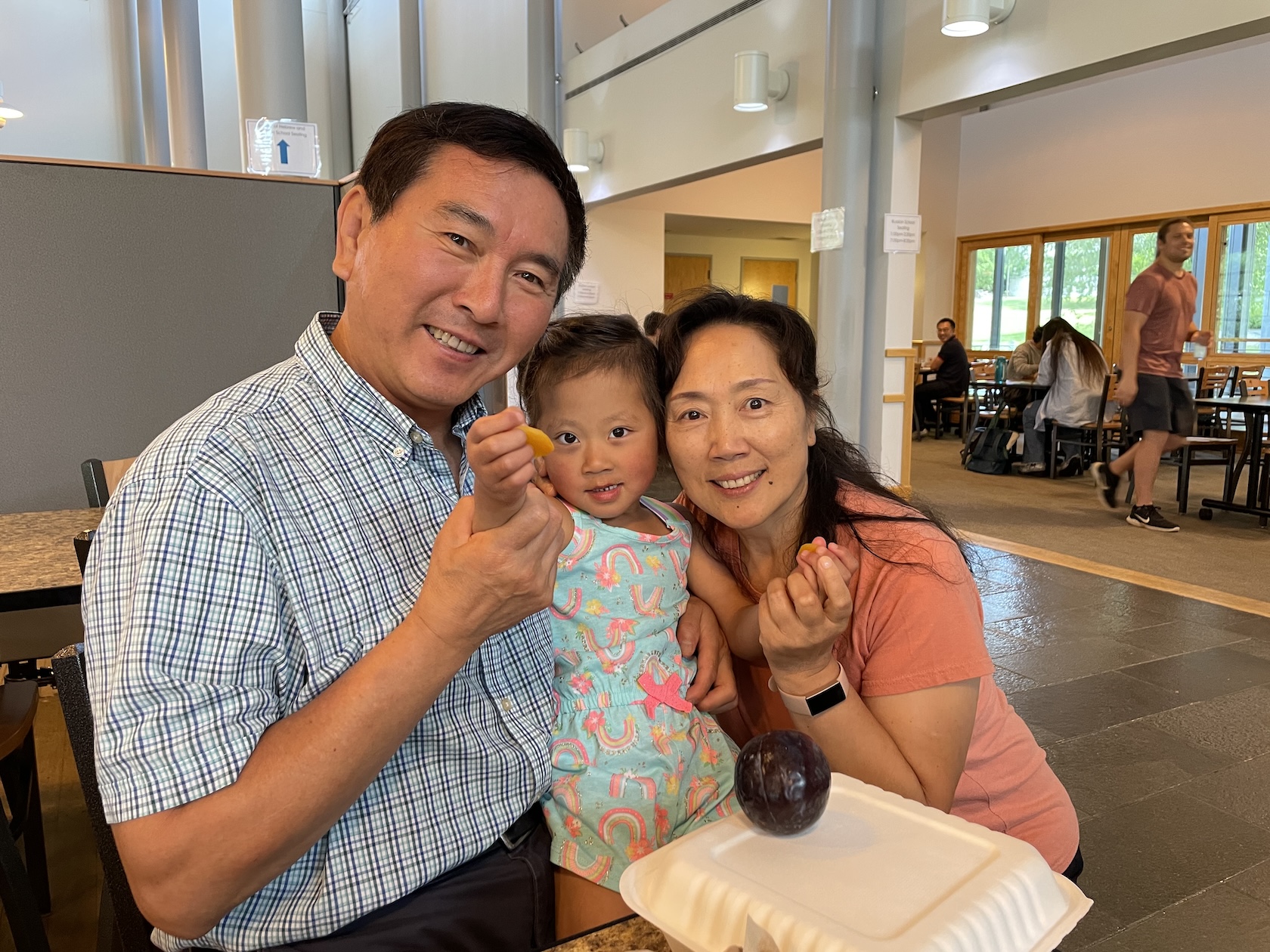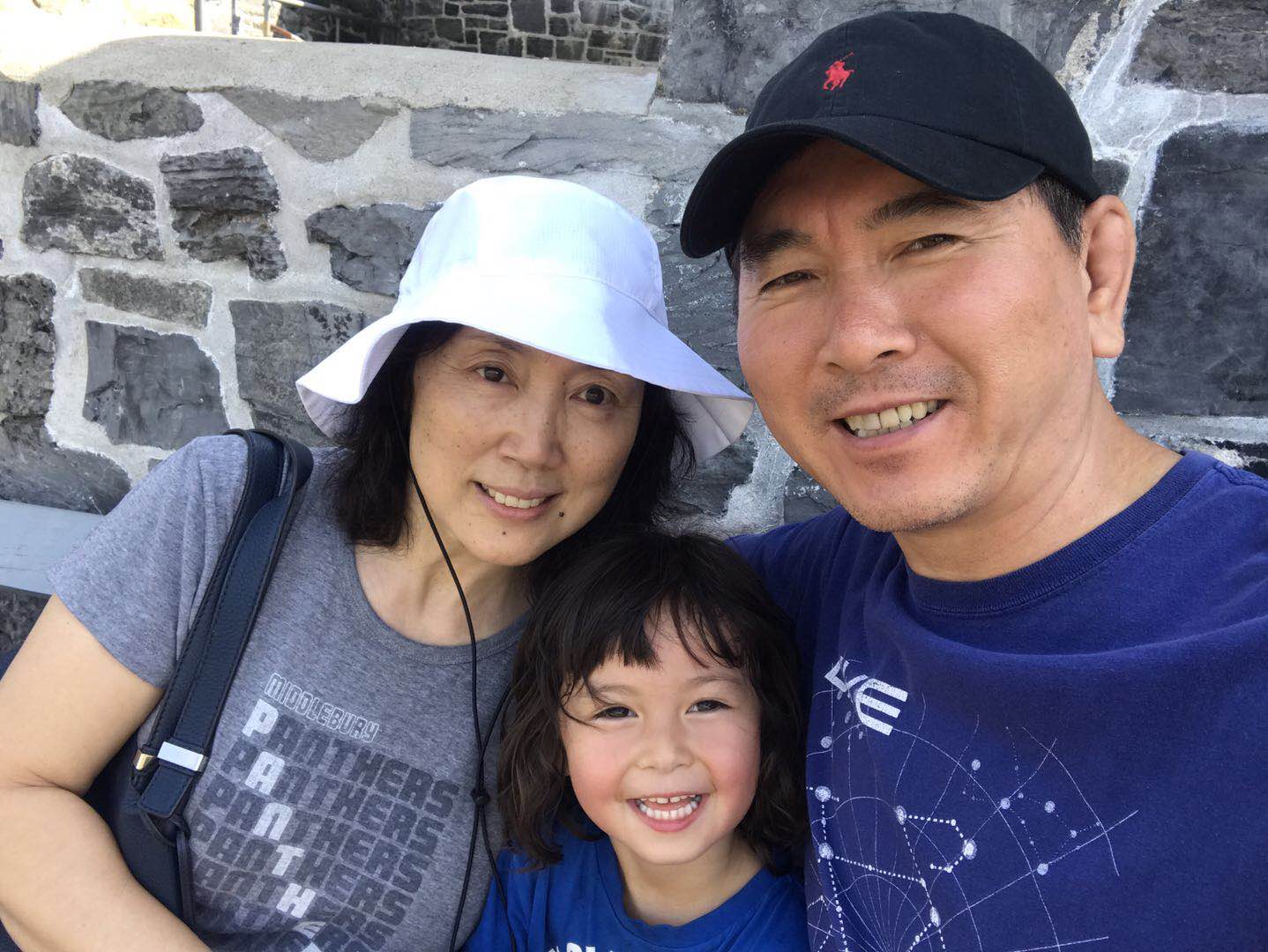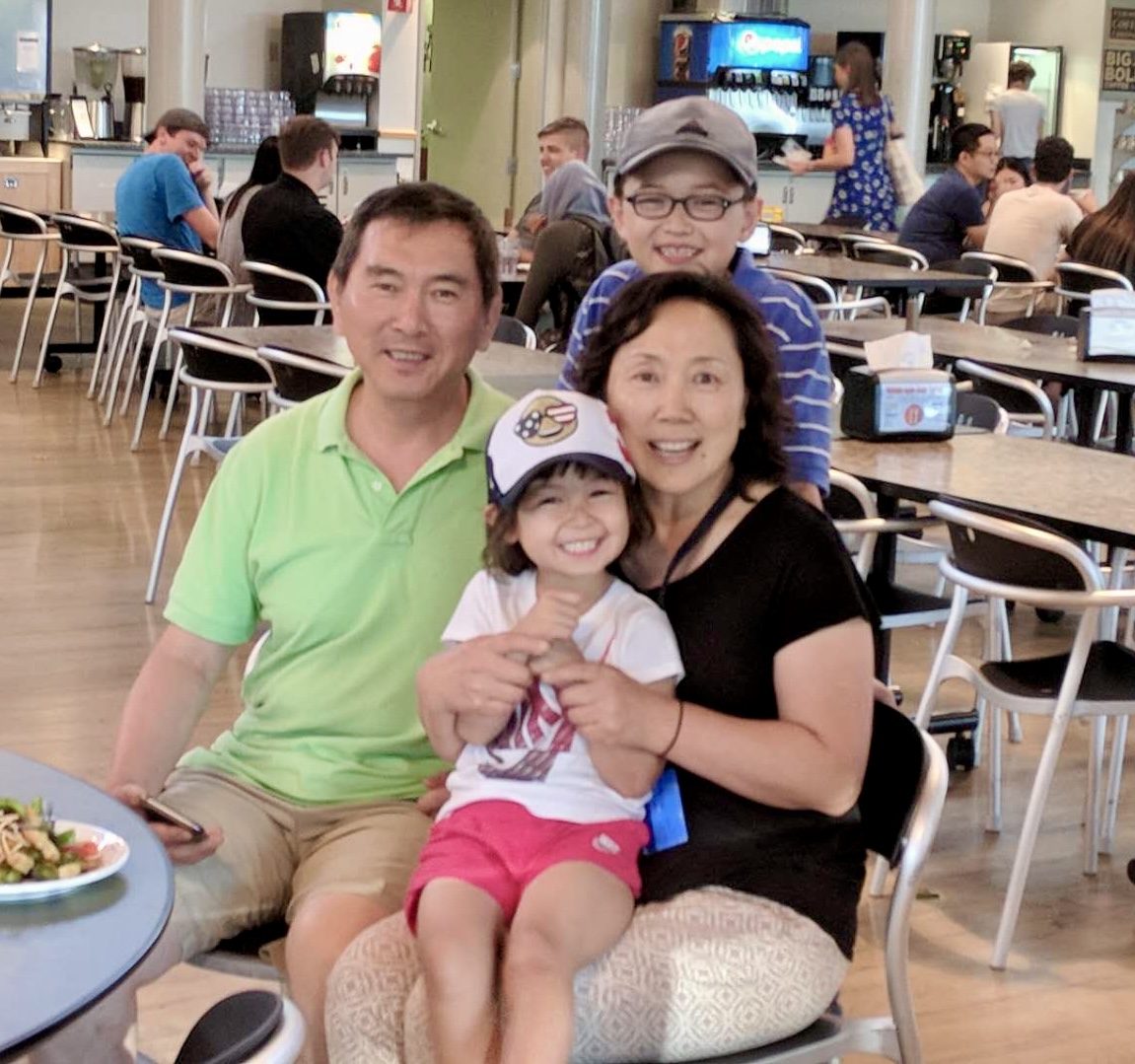25 Years at the Chinese School: Honoring Chen Tong Laoshi
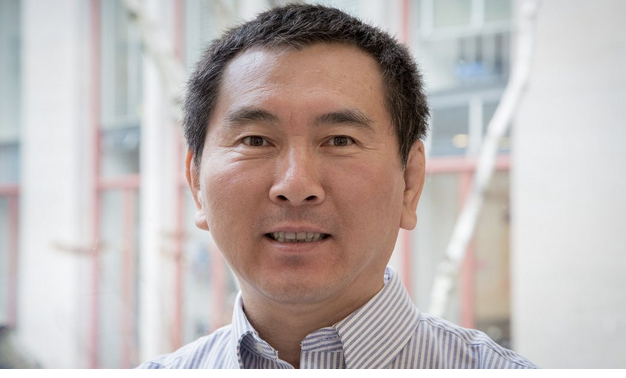
Chen Laoshi dedicated 25 consecutive summers to the Chinese School. A lead teacher at the school, he inspired the next generation of teachers and brought immeasurable energy, tradition, and joy to the community. Many of the traditions he began will live on as the Chinese School celebrates its 60th year in Summer 2025.
Faculty Spotlight: Professor Tong Chen, Chinese School
Academic year position: Massachusetts Institute of Technology
Hometown: Tianjin, China
Program/Level: Lead Teacher, Level 1
Summers taught: 25
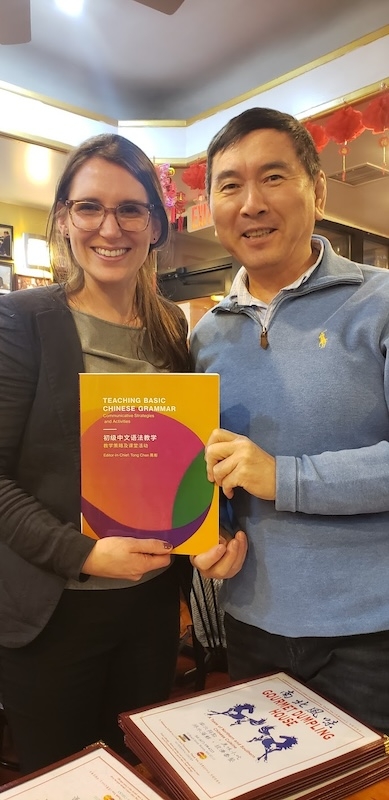
Perspectives from Mairead Harris
Mairead is the former Associate Director of the Chinese School, a Lecturer in the Chinese Department at Middlebury College, and the winner of the Marjorie Lamberti Faculty Appreciation Award. We asked her about Tong Chen’s contributions to the Chinese School and his impact on her career and growth in the profession.
What kind of teacher/colleague is Chen Laoshi?
As a teacher, he is very much a performer. He has great physical humor, which works very well, especially teaching level 1. He does great impressions, fun faces and silly gags to keep students in the lesson, even when they may only know a very small amount of language. He makes the input comprehensible by providing extra gestures and facial expressions, and he does it in a fun way.
He has a great sense of humor, and that comes through whether you’re at Level 1 or in the master’s program.
Snapshots from throughout the years...
Chen Laoshi’s humor and joy make learning accessible to scholars of all levels.
As a colleague and the Lead Teacher for Level 1, he has been extremely supportive of teachers who teach under his guidance. I taught Level 1 for 6 summers, and each day we have meetings during which we prepare together. He always ensures that the newer teachers get involved in the planning.
He encourages discussions about what we’re doing in the classroom, the choices we’re making, and why.
He also pulls in younger colleagues and early career teachers to do projects outside of the Language Schools.
Under his guidance, we’ve published two books with two different groups of Chinese School teachers:
One of these books was Teaching Basic Chinese Grammar, a publication that includes snapshots and mini stories for beginning Chinese.
These stories are aimed at the level 1 language level. We tried to bring in more substantive cultural content with a really wide variety of reading materials that are appropriate for that level.
Chen Laoshi is always looking for things we can do to bring in younger colleagues to give them an opportunity to work with more experienced teachers on projects that meaningfully contribute to the profession. For example, he encouraged me early in my career to run for office in the board of directors of the CLTA.
He’s very supportive of early career teachers in very concrete ways.
What kind of friend is Chen Laoshi?
As a friend, he’s a lot of fun. He’s very inclusive and he wants everyone involved and everyone to have a good time. He loves a group gathering. He is the ringleader for activities. He loves to go for walks after dinner and take silly photos. He is very much about cultivating a group dynamic that is both inclusive and fun for everyone.
What are some of his most important contributions to the Chinese School?
Most obviously, his teaching. He serves as a role model for a lot of new teachers, and his impact on students is huge. His leadership of level 1 is extremely important. Level 1 is our base and foundation, and many students return to the Chinese School for multiple summers after seeing so much progress at Level 1.
He also makes the Chinese School a space where we live in community. He organizes teacher outings, building community amongst our teachers.
He does haircuts for students, faculty, staff, and bilingual assistants. He does dozens of haircuts throughout the summer!
Having trained as a chef in China before moving to the United States, he is also a great cook. He has even organized huge Chinese dinners for the whole school. Teachers would contribute and prep, and the whole school would gather for a massive Chinese meal.
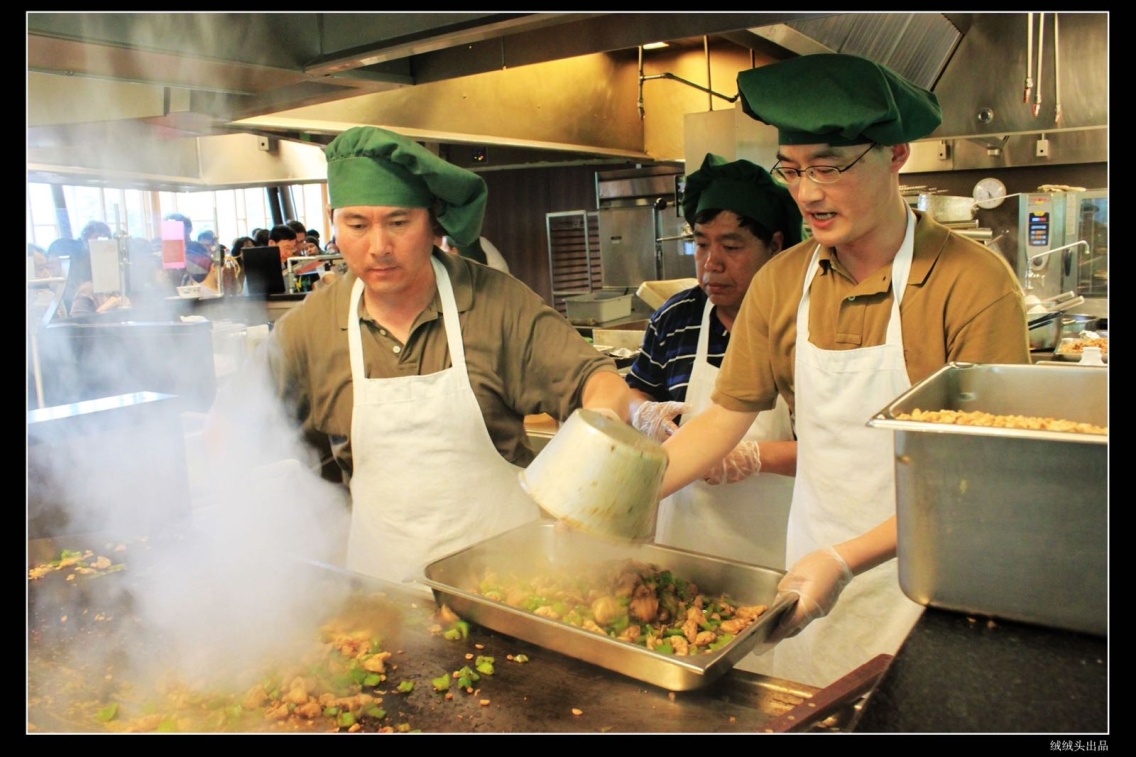
One thing he cooks now is tea eggs: hard boiled eggs in a broth of black tea, soy sauce, and spices. He started making them just as a snack for the teachers for class prep meetings. But, as folks started to notice the scent of them wafting down the hallway, more people started eating them, and so he started making more and more. It’s become a daily routine that he makes these tea eggs, and people come by the office to chat and grab one.
He’s everywhere. He’s always at every big event. He has coached the soccer team, he has run China night, our big talent show. And now he is passing the torch to a new generation of teachers. Thank goodness we have someone who is going to continue making those tea eggs. Come on by Forrest Hall and try one!

Overall, his most important contribution is being so involved in the school and making it such a fun place to be.
His son is now 22 and has been coming every summer since he was born. His wife is here too and having them here each summer as a family makes the school feel that much more homey. His family makes every effort to make sure students and teachers have that family feeling/feeling of home as well.
How does Chen Laoshiwork to make content comprehensible to all students across all learning styles/abilities?
He, and I, and two other teachers did a panel presentation at CLTA two years ago about accommodations, universal design, working with students with disabilities, and thinking even beyond the accommodations you’d find in an accommodations letter. Within the last few years at the Chinese School, we’ve had students with disabilities related to the senses most crucial to language learning: sight and sound. We did a presentation summing up some of the strategies we’ve used to work with these specific students in a college setting. We discussed working with an ADA office proactively and productively as well as things we can do in our course design that involve predicting the needs students may have. For example, we know some students will require extended time, so we decided to just make that an option and build it right into the curriculum.
Chen Laoshi approaches learning differences with a strong sense of curiosity. He asks “How can we make this work for this student so that they can reach their goals?”
In the classroom, he is especially good with utilizing those non-verbal cues and clues to help students grab onto meaning, even when they are slower to respond to verbal cues. He is sensitive to who he is calling upon in class, gauging who is feeling comfortable enough to answer and who he can joke around with in each moment versus who needs some processing space.
He is very perceptive of group and emotional dynamics in the classroom. This results in a class presence that is truly inclusive. We have a lot of time built into our schedule for professors to work with students one on one, and he never shies away from an opportunity to provide that extra support wherever needed.
What do you think kept him coming back for 25 years?
Nostalgia. This is a place where his son grew up, and he enjoys being surrounded by this diverse Chinese-speaking community.
I think it’s a unique experience for anyone who’s normally teaching in a department or university to be here with so many different people and colleagues and be exposed to fresh perspectives and ideas each summer.
I think that that opportunity to engage with new and different colleagues is one thing that keeps him coming back. He truly loves the community and the environment of being here.
A lot of my professional growth is thanks to him and his influence, and I’m not the only teacher that can say that. I’m very grateful to have had these years working together.
Perspectives from Hsin-Hung (Sean) Yeh
Sean has been a teacher at the Chinese School for 10 years and currently serves as Lead Teacher, Level 1. I asked him about Chen Laoshi’s contributions to the Chinese School and what his leadership has meant to him as he has grown as a person and educator.
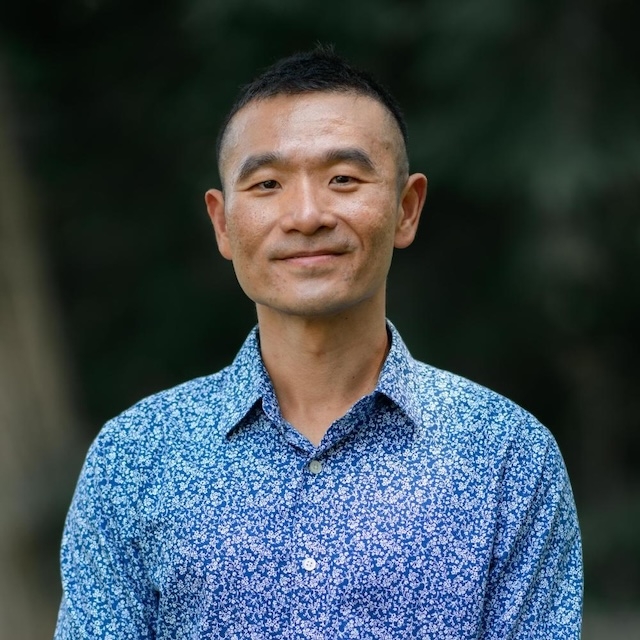
The first year I came here is 2014, and at that time I was teaching full time at Harvard. One summer I said to myself “Hmm, maybe I should do something different.” I asked my colleauges for some insights, and they said maybe you should try Middlebury. It was new to me, but I just applied.
I love it. It’s the most diverse, intensive program I’ve ever seen. In the US, in China, or in Taiwan. I like it so much, and that’s why I’ve come back every summer.
I really love this place. Middlebury is why I got a chance to pursue my PhD at Stanford. The first summer I was a little confused and lost in my career path. And I asked Jing Wa Bei, the former director of Chinese School for his insight. He said maybe you should try these schools - and I didn’t know about those possibilities. So, as a result of my first summer spent at Middlebury, I got a chance to pursue my PhD. Middlebury is important in my life.
Why do you like teaching at Middlebury?
It’s pretty diverse. Teachers, staff, and students are all from different places. We have students of all ages, backgrounds, and learning styles.
I do see that my pedagogical practices are transformed or become transformative because of my experiences here.
Because the students are just so diverse, regardless of their academic background, and because of their work experiences. We teach government officials, for example, and other kinds of professionals, and that is just very different student to which to teach. The topics we cover in class are not just about school. We need to talk about companies, we need to talk about other contexts, and that makes a huge difference when designing my curriculum.
Tell me about your journey teaching at the Chinese School.
I started my first 4 years as a small teacher, drill instructor, director’s assistant. At the Chinese School, we have 5 levels with lead teachers as well as drill instructors: “small teachers.” I taught the drill level for level 2 for 4 years.
Starting in 2018, Cecilia Chang, the current director, promoted me to lead teacher for level 4.
I like teaching level 4 because you can really communicate with students, as their proficiency is really high, so you can really enjoy the conversations with the students.
We can talk about all different topics, social issues, global issues, and students engage themselves in these conversations. It’s quite motivating for them. Because they care so deeply about what they’re discussing.
What kind of teacher is Chen Laoshi?
I think he is definitely the most dedicated teacher here. I won’t say one of, because he is. He is very caring and very supportive. He’s a wonderful chef. He got his level 2 certification from Chinese government, so he cooks really well. He’s a humorous barber or hair stylist, a great musician, and a talented ping pong player. He is also an active organizer of our unofficial evening walk club after dinner.
So he’s a real renaissance man?
Yes. Totally. I think that’s because he experienced the cultural revolution. And so that encouraged people of that time to become renaissance men. They did it in order to survive.
He also cares about the students. He cares about the physical and mental health of everyone in the Chinese School. He tries to include everyone in his class and every colleague In the Chinese School.
What have been his biggest contributions to the school?
If I’m going to share his contributions here to the Chinese School, I think it would probably take the whole day. He’s everywhere. you will see him talking to colleagues, students, and professors in Ross and Proctor, sharing his various life and teaching experiences. Teaching students and colleagues how to make authentic Chinese food. He’s also very humorous. He’s always sharing his witty jokes.
He makes so much authentic Chinese food for us. One example is the Chinese tea eggs, brewed in tea.
Every morning when I finish my morning walk, I always pass by our kitchenette in Forrest Hall and I can smell the Chinese tea eggs, and so that’s a kind of a feeling of “this is home.”
He’s like a father to me. He really loves and enjoys doing things for the Chinese School. And I can feel that he’s doing this from the bottom of his heart. He’s energetic, sincere, and welcoming. He’s like father or grandfather to everyone, really. His most important contributions are his care for his colleagues and friends, and also the extra services he’s done for the Chinese School.
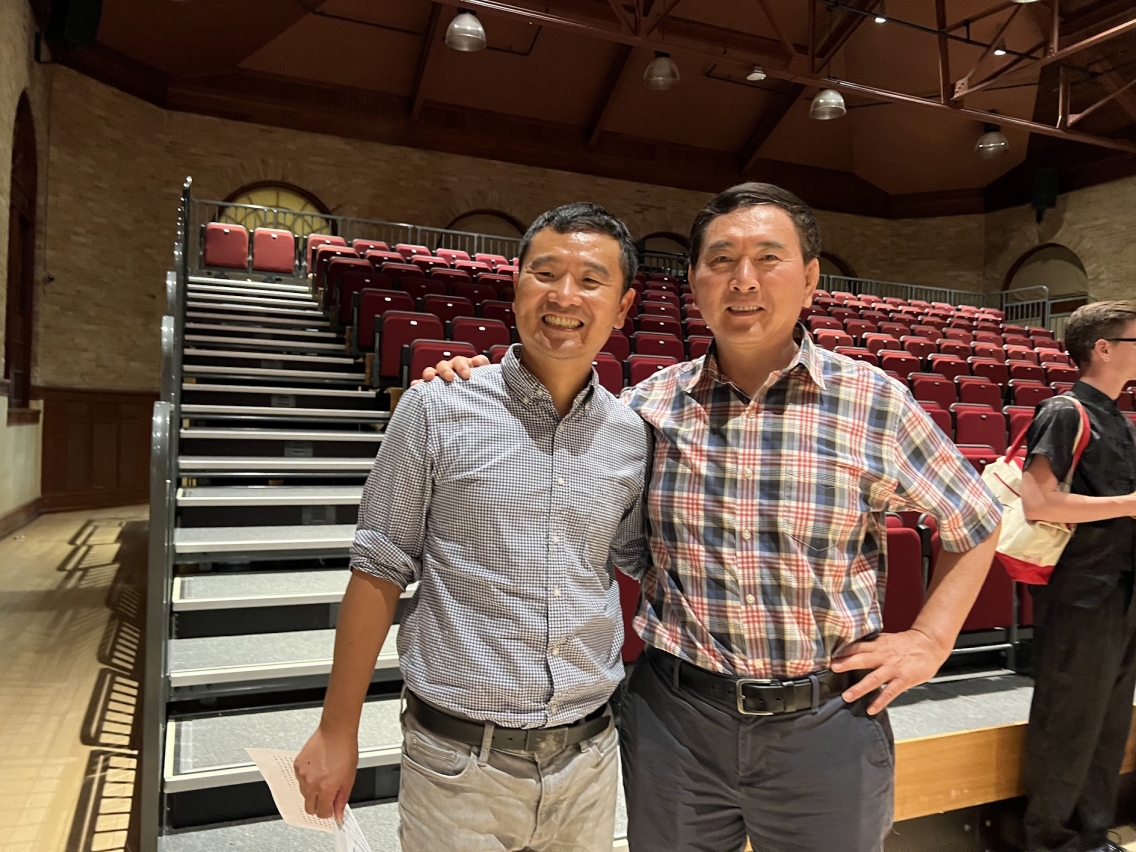
I have to mention that even though he has given 25 summers to the Chinese School, I have never seen any seniority issues. He never thinks that he’s so experienced that he doesn’t need to listen to me. He’s not the kind of person who wants to show off his authority or power or experience to other teachers. Instead, I’ve seen a growth mindset from him. He changes curriculum based on feedback from students and colleagues each year. And he has published several textbooks. He keeps improving himself each summer based on feedback.
I learned the spirit of a growth mindset from him.
He’s also on good terms with the staff in the dining hall and with teachers from other schools. He’s not only curious about the Chinese School but about the whole community at Middlebury.
I feel like crying that I won’t see him next summer. We are breakfast buddies. We go to Ross and Proctor and chat every morning, so we are breakfast buddies.
Tell me a little about his family and their time at the Chinese School.
I think that’s one of the reasons that kept bringing him back for 25 years. He really loves teaching Chinese and language, but his family is also one of the reasons that kept him coming back for 25 years. He mentioned in his farewell party that his kid is now grown. I’ve seen him grow up; he’s taller than me. He spoke about his son always mentioning “Dad, when are we going back to Middlebury?” He cried when he recalled his kid asking this question.
What else do you think has kept him coming back to the Language Schools?
His sense of responsibility has kept him coming back for 25 years. He really loves this place and hopes that this program can thrive for many, many years to come. He always encourages me to return to Middlebury.
Besides our director, I will be the most experienced teacher here next summer. I will be the oldest. I don’t think it’s given me pressure. It’s encouraged me to come back for this program. He’s leaving but he’s still hoping that this program can thrive. He mentioned that it’s really important for people like him to return and pass on their experience. And also the skills of making authentic Chinese food. I learned how to make Chinese tea eggs. So next summer I will be in charge of making the eggs.
He has made to continue the spirit of the program.
What aspects of the Chinese School specifically do you hope live on as a result of his legacy?
I hope that the community and diversity of the community continue on now that he is gone, and also the growth mindset. And that we are not afraid of making mistakes.
[The Chinese School] is a really lovely place. I would say it’s a blessing to be able to spend time here at Middlebury.
Come by this summer to get an egg. Ay time. We have lots of eggs.
Chen Laoshi, in his own words…
What brought you to the Language Schools originally?
There are a few reasons:
1. My love for Chinese language and my passion for education. I believe that language is a vessel for culture. Through teaching Chinese, I can not only help students develop their language skills but also help them gain a deeper understanding and appreciation of Chinese culture, values, and ways of thinking.
I hope to share the beauty of Chinese language and culture with more people through teaching while enjoying the process of growing together with my students.
2. Education has always been a field I am passionate about. I enjoy standing in front of a class, speaking to students and answering their questions. Seeing the excitement on their faces as they master a new language and watching their perspectives broaden as they understand a new aspect of Chinese culture brings me a profound sense of accomplishment. I aspire to be their guide and companion on their learning journey, growing and progressing alongside them.
3. As our society becomes more and more globalized, the importance of Chinese, one of the most widely spoken languages in the world, is becoming increasingly evident. Whether in business, technology, culture, or other fields, mastering Chinese opens up a wide range of opportunities for individuals. Therefore, I also hope to contribute to the cultivation of more talents with a global perspective and cross-cultural communication skills through my efforts.
What has kept you coming back to the Language Schools for all these years?
1. The Chinese School is well known its excellent teaching philosophy and methods. The school focuses on developing students’ practical language skills using a variety of engaging activities and interactive sessions to spark their interest and motivation. At the same time, the school places a strong emphasis on the professional growth of its teachers, offering numerous training and learning opportunities that allow us to continuously improve our teaching skills and educational philosophies. I deeply resonate with this student-centered, results-oriented teaching philosophy and am committed to supporting it.
2. The team atmosphere and interpersonal relationships formed at the school are also reasons why I have returned year after year. Here, I have met a group of like-minded, passionate colleagues. We support each other, learn from one another, and face the challenges and difficulties of work together. This team spirit and sense of unity are like no other, making me cherish every day I spend within this community even more.
3. I am deeply touched by the care and attention the school extends to its students. The school not only focuses on students’ academic performance but also on their mental and physical well-being and overall development. Regularly organized extracurricular activities and cultural talks give students opportunities to engage with the broader world, expanding their horizons and experiences. I greatly admire this student-centered, holistic approach to education, and it motivates me even more to contribute to the growth and development of our students.
4. the support and recognition the school has provided for my personal career development are also significant factors that have kept me coming back over the years. The school has offered me ample opportunities for professional growth, allowing me to continually experiment with new methods and ideas in teaching, and to pursue my career aspirations. Additionally, the school has consistently acknowledged and appreciated my work, giving me a strong sense of value and accomplishment. This respect and care for teachers have made me feel both warmly encouraged and more determined in my career choice.
What have you learned from your colleagues?
I’ve had the opportunity to learn a lot from my colleagues:
1. To start, I have learned various teaching methods and techniques. Everyone has their own unique teaching style and areas of expertise, and their innovative methods and adaptability in teaching have been truly inspiring. By observing and learning from their methods, I have continuously experimented with incorporating new elements into my own classes, making the lessons more engaging and stimulating for students.
2. I have learned the importance of teamwork and communication. Through collaborating with colleagues on lesson planning, organizing activities, and solving teaching challenges, I have experienced the power of teamwork. We support and encourage each other, face challenges together, fostering a sense of warmth and strength within the team. I have also learned how to communicate and collaborate more effectively with colleagues. Through effective communication and negotiation, we can accomplish tasks more efficiently and achieve our shared goals.
3. Their serious attitude towards work and meticulous approach have deeply impressed me. Whether it’s lesson planning, teaching, or grading, they strive for excellence, and this commitment has been truly inspiring. Their solid professional knowledge and extensive practical experience have also been incredibly beneficial to me.
4. I have learned from my colleagues how to better care for students and focus on their growth. They listen attentively to students’ needs and concerns and actively provide support and assistance. This level of care and attention has moved me deeply. I have also become more attentive to students’ individual differences and holistic development, striving to offer more personalized and targeted teaching services.
What do you hope your colleagues have learned from you?
I hope my colleagues can learn the following from me:
1. A Spirit of Continuous Learning and Self-Improvement: I firmly believe that as educators, we need to continuously learn and update our knowledge to adapt to the ever-changing educational environment and student needs. I encourage myself to maintain curiosity, explore new teaching methods and technologies, and share these discoveries with others. I hope my colleagues can feel this passion for knowledge and dedication to self-improvement, inspiring them to continue growing as well.
2. A Positive Attitude and Optimistic Mindset: When faced with challenges and difficulties in teaching, I tend to maintain a positive attitude and an optimistic mindset. I believe that there is always a solution to any problem. This attitude not only helps me handle pressure better but also sets a good example for the students. I hope my colleagues can learn from me this spirit of confronting challenges positively and how to find opportunities and growth in adversity.
3. Care and Patience for Students: I understand that every student is unique, with different backgrounds, needs, and learning abilities. Therefore, I always strive to understand each student, respect their differences, and provide personalized attention and support. I hope my colleagues can feel the deep affection and patience I have for students, and be inspired to pay more attention to students’ individual differences and holistic development, offering more thoughtful and effective educational support.
4. Awareness of Teamwork and Collective Progress: I firmly believe that teamwork is crucial for advancing the school and enhancing teaching quality. I enjoy sharing teaching experiences and resources with colleagues and collaboratively exploring teaching challenges and solutions. I hope my colleagues can sense my emphasis on and passion for teamwork, and be inspired to actively participate in team activities, contributing to the school’s development. Additionally, I hope we can learn from and support each other, continuously improving our professional skills and teaching standards through collective progress.
What makes the Chinese School so special?
What makes this Chinese School so special I think can be attributed to the following aspects:
1. Innovative Teaching Philosophy and Methods:
Focus on Practical Use: The school not only teaches Chinese language knowledge but also emphasizes developing students’ practical language skills. Through a variety of engaging activities and interactive sessions, students learn and grow through hands-on experience.
Personalized Instruction: The school pays attention to each student’s individual differences and provides personalized teaching services to ensure that each student receives a learning method and pace that suits them.
2. Outstanding Faculty
Rich Professional Background: The teaching team consists of educators with strong academic backgrounds and extensive teaching experience. They not only possess solid expertise but also have the ability to convey complex language concepts in a clear and understandable manner.
Ongoing Learning and Improvement: The teachers maintain a continuous learning attitude, constantly exploring new teaching methods and technologies to adapt to evolving times and meet students’ needs.
3. Diverse Cultural Atmosphere
Support from Bilingual Assistants: The school employs bilingual assistants who serve as a bridge for language and cultural exchange, helping students overcome language barriers and better integrate into the Chinese learning environment.
Different Background Teachers: The school hires teachers from Mainland China, Taiwan, and non-native Chinese from America, creating a diverse cultural atmosphere that fosters exchanges.
4. Focus on Students’ Holistic Development
Comprehensive Skill Development: The school not only focuses on students’ academic performance but also emphasizes the development of their overall qualities, including critical thinking, creativity, teamwork, and other skills.
Why do students make so much progress at the Chinese School?
This can mainly be attributed to the following aspects:
-
Professional Teaching Team:
Experienced and Qualified Teachers: TheChinese School has a team of experienced and highly qualified teachers. These teachers are not only proficient in Chinese language and culture but also employ advanced teaching philosophies and methods, tailoring personalized teaching plans based on students’ needs.
Effective Teaching Methods: Teachers use approaches such as guided instruction and differentiated teaching to stimulate students’ interest and motivation, helping them better understand and master Chinese language skills.
-
Immersive Learning Environment:
Creation of an Immersive Environment: The Chinese School strives to create an immersive learning environment where students are exposed to Chinese in their daily lives. This helps students better integrate into the Chinese linguistic context and enhance their language skills.
Cultural and Language Activities: The school organizes various cultural activities and language practice sessions as well as cultural talks, allowing students to learn and use Chinese in a relaxed and enjoyable atmosphere.
-
Scientific Teaching Management:
Emphasis on Scientific and Standardized Management: The Chinese School focuses on the scientific and standardized management of teaching, establishing comprehensive teaching management systems and evaluation frameworks. These systems ensure the orderly conduct of teaching and help identify and address issues in a timely manner.
Regular Student Assessments: The school regularly evaluates students’ learning progress and performance to understand their academic situation and advancements, allowing for timely adjustments to teaching strategies and methods.
-
Focus on Students’ Holistic Development:
Attention to Comprehensive Growth: The Chinese School not only focuses on language learning but also on students’ overall development. The school organizes various extracurricular activities, allowing students to cultivate their interests and hobbies, as well as develop qualities such as teamwork, alongside learning Chinese.
How has your curriculum work helped students succeed at the Chinese School?
1. I focus on the practicality and applicability of the curriculum by designing content that is close to students’ lives and meets real needs. This allows students to genuinely apply what they have learned during the learning process and improve their language skills.
2. I take students’ interests and learning habits into account, using diverse teaching methods and techniques, such as gamified teaching and situational learning, to spark their interest and enthusiasm. This approach encourages them to be more actively engaged in their learning.
3. I emphasize the interactive and participatory aspects of the curriculum. Activities like group discussions and role-playing encourage communication and collaboration among students, fostering their teamwork and communication skills. This interactive teaching approach not only helps enhance students’ language abilities but also supports their overall development.
4. I closely monitor students’ learning progress and feedback, making timely adjustments and optimizations to the course design to ensure that teaching objectives are met. Through continuous effort and improvement, my course design has achieved significant results, helping many students make excellent progress and achieve outstanding results in the Chinese school.
What do you hope your students take away from their time in your classroom?
1. I hope my students will gain multifaceted growth and benefits in my classroom. I aim for them to solidify their Chinese language skills, including listening, speaking, reading, and writing, so they can communicate fluently and accurately in Chinese.
2. I hope my teaching will help develop their cross-cultural communication skills. Chinese is not only a language but also a carrier of Chinese culture. I want students to understand China’s history, culture, social customs, and ways of thinking, which will enhance their cross-cultural sensitivity and adaptability, laying a solid foundation for future international interactions.
3. I place a strong emphasis on cultivating students’ critical thinking skills. In the classroom, I guide students to analyze problems, evaluate information, and form viewpoints, fostering their independent thinking and judgment abilities. This will help them confidently and autonomously tackle various challenges in their future studies and lives.
4. I want my students to master methods and skills for autonomous learning. Learning Chinese is a long-term and ongoing process, requiring students to have the awareness and ability to learn independently. I encourage students to set learning goals, choose appropriate resources, and reflect on and summarize their learning outcomes, thus developing their habits and abilities for self-directed learning.
What are some key elements you strive to bring to your classroom/learning environment?
In the classroom and learning environment, I strive to create the following key elements to promote student learning and growth:
1. Positive Learning Atmosphere: I am committed to fostering an uplifting and encouraging learning environment where exploration and expression are valued. By creating a relaxed and enjoyable classroom atmosphere, I aim to make students feel comfortable and safe, encouraging them to actively participate in class activities and discussions.
2. Student Engagement and Interaction: I encourage students to actively engage in classroom activities, including asking questions, participating in discussions, and sharing viewpoints. Various interactive methods such as group work and role-playing are used to stimulate students’ interest and motivation, promoting intellectual exchange and collaboration.
3. Practice and Application: I emphasize the integration of theoretical knowledge with practical application. By designing real-life scenarios and tasks, students can reinforce their learning, while improving their language and problem-solving skills. Additionally, I encourage students to apply what they’ve learned in their daily lives to enhance their sense of achievement.
4. Personalized Guidance and Support: I pay attention to each student’s individual differences and learning needs, providing tailored guidance and support. By understanding students’ learning styles, interests, and progress, I can create customized learning plans to help them overcome difficulties and achieve their personal goals.
5. Integration of Technology and Resources: I make full use of modern technological tools and educational resources, such as multimedia devices and online learning platforms, to provide a rich and diverse learning experience. I also encourage students to use online resources for independent learning and exploration, fostering their information literacy and lifelong learning skills.
What are some lessons you’ve learned from your students over the years?
1. I’ve learned the importance of flexible teaching. Each student is unique, with different learning styles, interests, and cognitive levels. Therefore, I’ve come to realize that teaching cannot be strictly bound to a fixed lesson plan but needs to be adjusted based on students’ actual situations and needs. By employing flexible teaching methods, I can better stimulate students’ interest and motivation, helping them better understand and master the material.
2. I focus on interest-driven instruction. Students are more likely to invest time and effort in learning when they find the content interesting. I try to connect students’ interests with the teaching material, using engaging examples, stories, or practical activities to spark their curiosity and enthusiasm. This approach not only improves learning outcomes but also fosters students’ self-directed learning and creativity.
3. I encourage students to explore the unknown. Students inevitably face difficulties and challenges during the learning process. Instead of providing immediate answers or solutions, I encourage them to try and explore on their own. Through this exploratory process, students can develop their critical thinking and problem-solving skills while also building confidence and courage.
4. I’ve come to deeply appreciate the importance of listening and understanding. Every student has their own thoughts and feelings. As a teacher, it’s crucial to listen to their voices and understand their needs and concerns. This approach helps us better assist students in overcoming problems and challenges, while also fostering a positive teacher-student relationship.
What does the Chinese School do exceptionally well?
The Chinese School excels in several areas I think, particularly in the following:
1. Preserving Chinese Culture: The school is dedicated to preserving and promoting Chinese culture through a diverse curriculum, including classical poetry, calligraphy, traditional Chinese painting, and cultural festivals. This approach not only deepens students’ understanding and appreciation of Chinese culture but also enriches their spiritual and cultural literacy, enhancing their sense of cultural identity and pride.
2. Providing an Immersive Learning Environment: The school works to create an immersive language learning environment where students are exposed to authentic Chinese language and culture both inside and outside the classroom. By simulating real-life scenarios, students can enhance their language skills and experience the richness of Chinese culture in a relaxed and enjoyable setting.
3. Developing Cross-Cultural Communication Skills: The school emphasizes the development of students’ cross-cultural communication skills. Through activities, students have the opportunity to interact with individuals from diverse cultural backgrounds. This not only improves their language proficiency but also fosters their understanding and respect for different cultures, helping them develop a global perspective and cross-cultural communication abilities.
Why are the bilingual assistants so important to the students’ experience in the program?
1. Motivating Students: The presence of bilingual assistants can spark students’ interest and motivation to learn. Knowing that there is someone who can help them with language challenges, students may become more eager to participate in class activities and engage more actively in their learning.
2. Cultural Interpretation: Bilingual assistants typically have a relatively good understanding of both cultures, allowing them to explain the differences and similarities between them to students. This cultural interpretation helps students better integrate into a new cultural environment, enhancing their cross-cultural awareness and inclusivity.
3. Cultural Exchange: Bilingual assistants can also serve as cultural liaisons between students and local peers or teachers. They facilitate communication and interaction among students from different cultural backgrounds, fostering mutual understanding and friendship.
4. Life Assistance: Bilingual assistants can help students with various aspects of daily life, such as answering questions about school life, housing, and transportation. This comprehensive support enables students to focus more comfortably and confidently on their studies
Why is the diversity of the faculty and staff so important?
The Importance of Diversity Among Staff
1. Promoting Comprehensive Student Development
Diversity among staff provides students with a broad range of perspectives and ways of thinking. Educators from varied backgrounds, with different experiences and skills, can incorporate unique cultural, intellectual, and personal viewpoints into their teaching. This exposure helps broaden students’ horizons, stimulating their creativity and critical thinking. Such an environment fosters holistic development, nurturing students’ global awareness and cross-cultural communication skills.
2. Enhancing Teaching Quality
A diverse staff brings different teaching methods and styles into the classroom. Each educator has their unique approach and areas of expertise, allowing them to tailor their teaching to meet the diverse needs and characteristics of students. This adaptability improves the effectiveness of teaching. Moreover, collaboration among diverse staff members promotes the sharing of resources and teaching experiences, further enhancing overall teaching quality.
3. Strengthening School Cohesion
Diversity within the staff helps build school cohesion and unity. Working together, staff members from various backgrounds can develop a mutual understanding and respect, creating a more harmonious and inclusive work environment. This positive atmosphere can inspire students, boosting their motivation and sense of belonging, which benefits the stability and growth of the school.
4. Reflecting Societal Reality
A diverse staff also mirrors the realities of a wider society. In today’s world, people come from different regions and have varied cultural backgrounds and beliefs. A diverse staff more accurately represents this societal diversity, providing students with a more authentic and comprehensive learning environment. This prepares them to better understand and integrate into society, laying a strong foundation for their future success.
Apply to our immersion and graduate programs at the Chinese School here!
Our final application deadline is May 15th!
